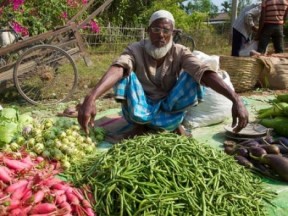Food prices in India continue to rise when international prices are stable because of the failure of domestic food management, wherein temporary shortages have led to price spikes, the International Labour Organization (ILO) has said.
Over the past two years, wholesale food prices have increased by 40 per cent much more than during the mid-1990s and 2004, and the retail food prices have increased faster, the ILO said at the release of the World of Work Report 2011: Making Markets Work For Jobs. The rising food inflation has led to tightening of the monetary policies, which has led to the slowdown in economic activity, especially the last two quarters. This puts further pressure on the labour market, where there is huge underemployment, it said.
Food prices in India have sky-rocketed over the past few years.The increase in food prices in India was, however, much lower compared to sharp increases in global prices due to various measures. Food prices in India certainly increased when global prices rose, but have been lower especially during the 2008 peak period largely due to various commodity-based policies: creation of grain banks through government procurement, storage and distribution, and restrictions on international trade. To regulate commodity futures in wheat, an outright ban on speculation was also introduced instead of outright export bans.
Despite these measures food prices in India continue to rise. The ILO said, this requires having a medium-term strategy which addresses the problems of agriculture – investments in irrigation, research and development, and making farming financially more viable for the farmers. The National Food Security Act , it remarked, was a step in the right direction but for it to be effective it is essential that the storage and distribution system is drastically improved so that it ensures universal access to basic food items to all at an affordable price.
The ILO report also features a new ‘social unrest index that shows levels of discontent over the lack of jobs and anger over perceptions that the burden of the crisis is not being shared fairly. It noted that in 45 of the 118 countries examined, the risk of social unrest is rising. This is especially the case in advanced economies, notably the EU, the Arab region and to a lesser extent Asia. By contrast, there is a stagnant or lower risk of social unrest in Sub-Saharan Africa and Latin America.
The report’s other main findings include:
- Approximately 80 million net new jobs will be needed over the next two years to re-attain pre-crisis employment rates (27 million in advanced economies and the remainder in emerging and developing countries).
- Out of 118 countries with available data, 69 countries show an increase in the percentage of people reporting a worsening of living standards in 2010 compared to 2006.
- Respondents in half of 99 countries surveyed say they do not have confidence in their national governments.
- In 2010, more than 50 per cent of people in developed countries report being dissatisfied with the availability of decent jobs (in countries such as Greece, Italy, Portugal, Slovenia, and Spain, more than 70 per cent of survey respondents reported dissatisfaction).
- The share of profit in GDP increased in 83 per cent of the countries analyzed between 2000 and 2009. Productive investment, however, stagnated globally during the same period.
- In advanced countries, the growth in corporate profits among non-financial firms was translated into a substantial increase in dividend payouts (from 29 per cent of profits in 2000 to 36 per cent in 2009) and financial investment (from 81.2 per cent of GDP in 1995 to 132.2 per cent in 2007). The crisis reversed slightly these trends, which resumed in 2010.
- Food price volatility doubled during the period 2006-2010 relative to the preceding five years, affecting decent work prospects in developing countries. Financial investors benefit more from price volatility than food producers, especially small ones.
This article was originally written for the Deadline Delhi column in Asian Correspondent. It has been reproduced here with the author’s permission. Subir Ghosh blogs at www.write2kill.in.






